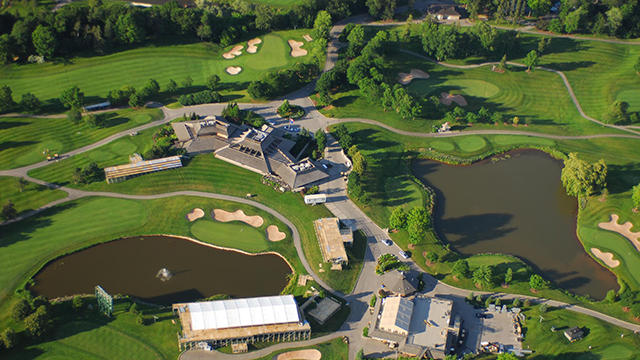UPDATED: Province Passes Law to Protect Oakville’s Glen Abbey Golf Course
Published April 16, 2018 at 3:29 pm

The Town of Oakville will have more say in local planning decisions – namely the Glen Abbey Golf Course – thanks to new legislation at Queen’s Park.
The Town of Oakville will have more say in local planning decisions – namely the Glen Abbey Golf Course – thanks to new legislation at Queen’s Park.
“We all know of Glen Abbey as one of Canada’s premiere golf courses and an important part of our community,” said Oakville MPP Kevin Flynn in an April 16 statement.
Flynn says he’s “committed to working with the town to ensure the preservation of green space and heritage sites within our community. I am extremely pleased that the determination of Glen Abbey’s future will be made locally, here in Oakville.”
The owner of the golf course, ClubLink, is trying to demolish the Glen Abbey lands for a mixed residential and commerical redevelopment. An application outlines plans for 141 detached dwellings, 299 townhouse dwellings, 2,782 apartment dwellings with retail and office commercial uses, parks and open space, and natural heritage uses.
But the matter is currently tied up in paperwork. ClubLink is appealing town council’s Sept. 2017 decision to refuse its development application to the Ontario Municipal Board (OMB).
Bill 139, or the Building Better Communities and Conserving Watersheds Act, was proclaimed into law on April 3.
It establishes the Local Planning Appeal Tribunal (LPAT) to replace the OMB.
The LPAT will give greater deference to local communities and municipalities with respect to zoning and development.
Bill 130 received royal assent on Dec. 12, 2017, Bob Ball from Flynn’s office confirmed.
In January 2018, town council passed the official plan and zoning bylaw amendments for Glen Abbey to extend the protections put in place by an interim control bylaw which maintained the existing uses on the sites.
In order to change the assigned usage of the Glen Abbey Golf Course, both of these would need to be appealed.
In accordance with the recently enacted transition provisions, any municipally-initiated matters such as official plan amendments and/or zoning bylaw amendments that were adopted after Dec. 12, 2017, are subject to the new rules.
Accordingly, any appeal of these amendments would now be subject to the new rules and will rest with the LPAT.
This will ensure that Oakville’s zoning by-law and official plan amendment will be determined by the LPAT using the new LPAT rules.
In other words, bylaws passed Oakville regarding Glen Abbey will be heard by the LPAT, not the OMB.
Save Glen Abbey Coalition spokesperson Fraser Damoff says he’s “very pleased” that while some decisions will be made by the OMB, “the most significant decisions regarding the future of Glen Abbey Golf Course will be decided by the province’s new Local Planning Appeal Tribunal (LPAT).”
More than 10,000 people have been fighting to save the historic golf course.
Glen Abbey was designed by golf legend Jack Nicklaus and is Canada’s most famous golf course. The Canadian Open has been held at the course 29 times.
A public pre-hearing is scheduled at Oakville Town Hall on April 27.
Court hearings begin July 16.
Photo courtesy of the Town of Oakville
insauga's Editorial Standards and Policies advertising





